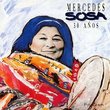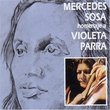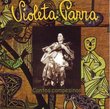| All Artists: Violeta Parra Title: Serie De Oro Members Wishing: 1 Total Copies: 0 Release Date: 6/21/2005 Genres: International Music, Latin Music Styles: South & Central America, Chile Number of Discs: 1 SwapaCD Credits: 1 UPC: 821838346524 |
Search - Violeta Parra :: Serie De Oro
 | Violeta Parra Serie De Oro Genres: International Music, Latin Music
|
CD DetailsSimilar CDs
|
CD ReviewsNice little selection P. Micocci | Houston, TX USA | 11/28/2004 (5 out of 5 stars) "This is a nice, if necessarily somewhat limited, selection of a dozen of Violeta Parra's earlier recordings, mostly from the period between her career as a duet with her sister Hilda, singing the popular music of the day in the dives or "boliches" of Santiago, and her perhaps better known latter period of more socially engaged work. Only one song in this collection, "Y arriba quemando el sol", is more or less politically oriented - it also seems to be the latest of these recordings; the others are a mix of folkloric songs and her own compositions assimilating the different styles of folk music she had learned from her parents as a child and on her travels and investigations throughout the length and breadth of Chile. There's also one song, "El hijo arrepentido", with text by her brother, the famous poet Nicanor Parra.
More people than ever today seem to be recognizing Violeta's importance as a pioneer of the Nueva Canción movement in Chile and her influence on other singer/songwriters throughout Latin America as well; perhaps many of her fans today aren't as familiar with the crucial role she played in preserving much of the folklore of Chile at a time when it was suffering sore neglect. Violeta, sometimes along with several of her children, spent a period of about 15 years, by her reckoning, traveling throughout the various regions of Chile collecting the music, stories, and other aspects of folklore and culture that were in real danger of disappearing as the last survivors of earlier generations passed away. With the influence first of England and then of the U.S. on Chile (as well as other parts of Latin America) and the advent of media such as radio and cinema, young people lost interest in carrying on the tradition of their elders - witness the advent of what was known in Latin America as the "Ye ye ye" movement in the 1960s (you can surely guess how that sobriquet originated). In 1957, Violeta and her children Carmen Luisa and Ángel moved to Concepción in the south of Chile where, under contract from the Universidad de Concepción, she began extensive investigation and preservation of this disappearing culture heritage; she also founded the Museo de Arte Popular. With her portable tape recorder, guitar, writing material, etc., she was personally responsible for saving a vast amount of folklore that was no longer known by more than a handful of old-timers in many cases; in addition to arranging and recording a large number of the songs she had collected, she also published a bilingual (Spanish and French) edition of "Popular Poetry of the Andes" in Paris, in 1965, and an article of hers, "Cuentos folklóricos" appeared posthumously in "Atenea", No. 423, Universidad de Concepción, 1970. Three of the songs in this collection are drawn from the vast store of folklore compiled by Violeta: the ribald and irreverent "El sacristán" and the two classics, "Ausencia" and "Qué pena siente el alma", here in a version with accordion that gives it a sort of Paris street music feel; if I'm not mistaken, it and "Casamiento de negros" are the versions recorded in Paris around 1956 rather than the earlier single versions put out by Odeón in Santiago in 1953, and the sound quality on these recordings is somewhat better. I believe some of the other songs could also be from those Paris recording sessions, but it's hard to tell - Violeta recorded a number of these songs more than once, and there's an unfortunate absence of production notes on this CD; the fact that this compilation was released by EMI Odeón SAIC doesn't really clarify matters, either. All in all, though, it's a pleasing set of mostly lighter-mood songs from Violeta. " |

 Track Listings (12) - Disc #1
Track Listings (12) - Disc #1



